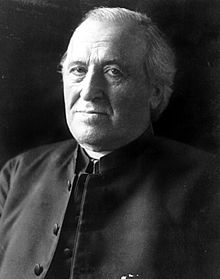John Ireland (bishop)
John Ireland (September 11, 1838 – September 25, 1918) was the third Roman Catholic bishop and first Roman Catholic archbishop of Saint Paul, Minnesota (1888–1918). He became both a religious as well as civic leader in Saint Paul during the turn of the 20th century. Ireland was known for his progressive stance on education, immigration, race, and relations between church and state, as well as his opposition to saloons and political corruption. He promoted the Americanization of Catholicism, especially in the furtherance of progressive social ideals. He was a leader of the modernizing element in the Roman Catholic Church during the w:Progressive Era. He created or helped to create many religious and educational institutions in Minnesota. He is also remembered for his acrimonious relations with Eastern Catholics.

Quotes
edit- There is a danger and a most serious one in corrupt morals. A people without good morals is incapable of self-government. At the basis of the proper exercise of the suffrage lie unselfishness and the spirit of sacrifice. A corrupt man is selfish ; an appeal to duty finds no response in his conscience ; he is incapable of the high- mindedness and generous acts which are the elements of patriotism ; he is ready to sell the country for pelf or pleasure. Patriotism takes alarm at the spread of intemperance, lasciviousness, dishonesty, perjury; for country’s sake it should arm against those dire evils all the country’s forces, its legislatures, its courts, and, above all else, public opinion. Materialism and the denial of a living, supreme God annihilate conscience, and break down the barriers to sensuality ; they sow broadcast the seeds of moral death : they are fatal to liberty and social order. A people without a belief in God and a future life of the soul will not remain a free people. The age of the democracy must, for its own protection, be an age of religion.
- 1894 speech on patriotism to Union veterans of the Civil War, McClarey, Donald R (2012-08-23). Father John Ireland and the Fifth Minnesota. Retrieved on 2018-02-04.
- There is but one solution of the problem, and it is to obliterate absolutely all color line. Open up to the Negro as to the white man, the political offices of the country, making but one test, that of mental and moral fitness. Throw down at once the barriers which close out the Negro merely on account of his color from hotel, theater, and railway carriage. Meet your Negro brother as your equal at banquets and in social gatherings. Give him, in one word, and in full meaning of the terms, equal rights and equal privileges, political, civil, and social. I know no color line, I will acknowledge none. The time is not distant when Americans and Christians will wonder that there ever was a race prejudice.
- McClarey, Donald R (2012-08-23). Father John Ireland and the Fifth Minnesota. Retrieved on 2018-02-04. [citation needed]
Sermon at St. Augustine Catholic Church (1890)
editOn 5 May 1890 he gave a sermon at w:St. Augustine's Church in Washington, DC, the center of an African-American parish, to a congregation that included several public officials, Congressmen including the full Minnesota delegation, U.S. Treasury Secretary William Windom, and w:Blanche Bruce, the second black U.S. Senator. According to a church chronicler, "The bold and outspoken stand of the Archbishop on this occasion created somewhat of a sensation throughout America." Butsch, Joseph (October 1917). "Catholics and the Negro". w:The Journal of Negro History 2 (4). Retrieved on 2018-01-29. Hogan, Liam (2015-06-04). Bishop John Ireland on Racism (1890). Retrieved on 2018-01-29.
- It makes me ashamed as a man, as a citizen, as a Christian, to see the prejudice that is acted against the colored citizens of America because of his colour. As to the substance, the colored man is equal to the white man; he has a like intellect, the same blood courses in their veins; they are both equally the children of a common Father, who is in heaven.
- A man shows a narrowness of mind and becomes unworthy of his humanity by refusing any privilege to his fellow man because he is colored. Every prejudice entertained, every breach of justice and charity against a fellow-citizen because of color is a stain flung upon the banner of our liberty that floats over us.
- No church is a fit temple of God where a man, because of his color, is excluded or made to occupy a corner. Religion teaches that we cannot be pleasing to God unless we look upon mankind as children of our Father in heaven. And they who order and compel a man because he is colored to betake himself to a corner marked off for his race, practically contradict the principles of justice and of equal rights established by the God of Mercy, who lives on the altar.
- Let Christians act out their religion, and there is no more race problem. Equality for the colored man is coming. The colored people are showing themselves worthy of it. Let the colored be industrious, purchase homes, respect law and order, educate themselves and their children, and keep insisting on their rights.
- The colour line must go; the line will be drawn at personal merit.